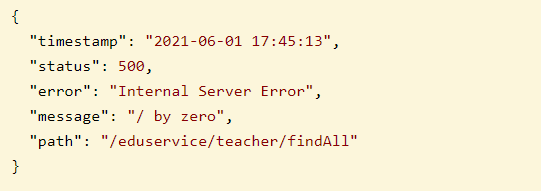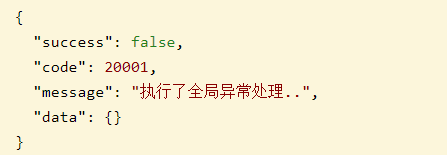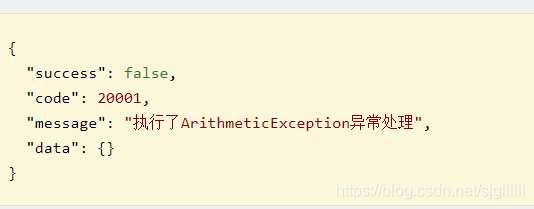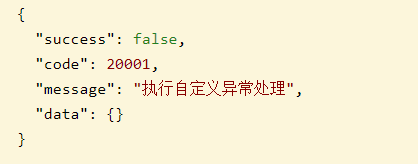您好,登录后才能下订单哦!
密码登录
登录注册
点击 登录注册 即表示同意《亿速云用户服务条款》
这篇文章将为大家详细讲解有关怎么在Springboot中处理异常,文章内容质量较高,因此小编分享给大家做个参考,希望大家阅读完这篇文章后对相关知识有一定的了解。

报500错误。在大量的代码中很难找到错误

添加异常处理方法
GlobalExceptionHandler.java中添加
//指定出现什么异常执行这个方法
@ExceptionHandler(Exception.class)
@ResponseBody //为了返回数据
public R error(Exception e) {
e.printStackTrace();
return R.error().message("执行了全局异常处理..");
}报错异常:在大型项目中,可对多种异常进行处理,便于找bug

定义异常,特别处理ArithmeticException异常


//特定异常处理
@ExceptionHandler(ArithmeticException.class)
@ResponseBody//为了返回数据
public R error(ArithmeticException e){
e.printStackTrace();
return R.error().message("执行了ArithmeticException异常处理");
}异常处理结果:

第一步:创建自定义处理类的实体类:
@Data
@AllArgsConstructor//生成有参构造方法
@NoArgsConstructor//生成无参构造方法
public class MyException extends RuntimeException{
private Integer code;
private String msg;
}第二步:在统一异常类中添加规则:
//自定义异常处理
@ExceptionHandler(MyException.class)
@ResponseBody//返回数据
public R error(MyException e){
e.printStackTrace();
return R.error().code(e.getCode()).message(e.getMsg());//封装自定义异常信息
}第三步:执行自定义异常
try{
int i=10/0;
}catch (Exception e){
throw new MyException(20001,"执行自定义异常处理");
}
以上使用的R类,用于封装json数据的格式:
@Data
public class R {
@ApiModelProperty(value = "是否成功")
private Boolean success;
@ApiModelProperty(value = "返回码")
private Integer code;
@ApiModelProperty(value = "返回消息")
private String message;
@ApiModelProperty(value = "返回数据")
private Map<String, Object> data = new HashMap<String, Object>();
private R(){}
public static R ok(){
R r = new R();
r.setSuccess(true);
r.setCode(ResultCode.SUCCESS);
r.setMessage("成功");
return r;
}
public static R error(){
R r = new R();
r.setSuccess(false);
r.setCode(ResultCode.ERROR);
r.setMessage("失败");
return r;
}
public R success(Boolean success){
this.setSuccess(success);
return this;
}
public R message(String message){
this.setMessage(message);
return this;
}
public R code(Integer code){
this.setCode(code);
return this;
}
public R data(String key, Object value){
this.data.put(key, value);
return this;
}
public R data(Map<String, Object> map){
this.setData(map);
return this;
}
}public interface ResultCode {
public static Integer SUCCESS = 20000;
public static Integer ERROR = 20001;
}关于怎么在Springboot中处理异常就分享到这里了,希望以上内容可以对大家有一定的帮助,可以学到更多知识。如果觉得文章不错,可以把它分享出去让更多的人看到。
免责声明:本站发布的内容(图片、视频和文字)以原创、转载和分享为主,文章观点不代表本网站立场,如果涉及侵权请联系站长邮箱:is@yisu.com进行举报,并提供相关证据,一经查实,将立刻删除涉嫌侵权内容。